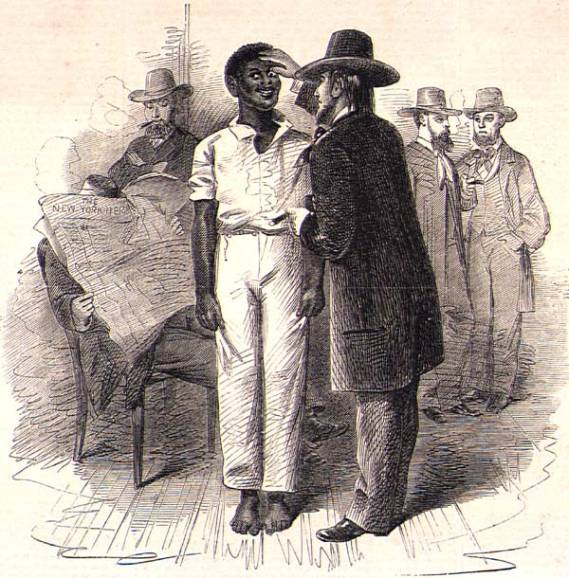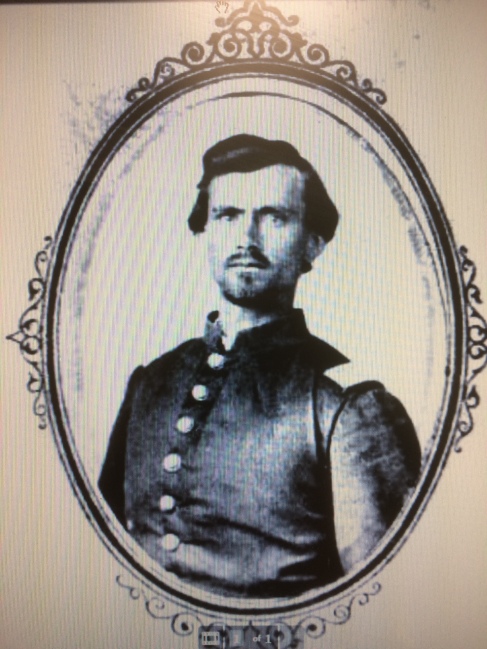I have long been interested in the evolution of Union soldier opinion on the question of slavery. The Army of the Cumberland, being largely composed of Midwesterners, contained fewer men in the ranks who might be considered initially inimical to the Peculiar Institution when they enlisted. New England, after all, was considered the bastion of abolitionism in the United States.
That’s not to say that there weren’t regiments imbued with anti-slavery fervor. The 92nd Illinois was certainly an “abolitionist” regiment, for example; as was the Norwegian 15th Wisconsin and most of the German units. A number of Quakers also left their faith to join what they considered a higher cause, as well.
The 27th Illinois was not such a unit. The regiment was raised in southwestern Illinois, near Saint Louis and along the Mississippi River. In general, the men fit the classical pattern of early-war Union troops: motivated to restore the Union but not caring all that much about Slavery.
Captain John F. Glenn commanded Company F of the 27th. Glenn was Irish-born, his birth date in the 1850 census given only as “abt [about] 1838. His family emigrated in the 1840s, possibly because of the Potato Famine. He enlisted as a sergeant, 22 years of age, and was promoted to Captain in January 1863, after the battle of Stones River.
Bu the summer of 1863, however, Glenn’s opinions on slavery had changed considerably:
Bridgeport, Ala. August 15, 1863
My dear Sister,
Yours of the 9 inst was received about ten minutes since. I was pleased [to] learn that you was at the time of writing well but I was not pleased at that part of your letter where you sympathize with the vile traitor Valandigham. “He is a much abused man” you say. I deny it and assert that if justice had been done he would have been in eternity. Have you read his speeches of the past two years?
Within a few yards of my tent stands the gallows where on thirty two Union Tennesseans were murdered for being devoted to the Union and the old flag. Their wives and children can be seen at any time at this place or rather in the neighborhood. I can point you to the graves of old grey haired men who because they would not inform where their sons were that was hid in the mountains, were taken out and shot down like dogs.
I have seen poor helpless women who were taken out of their houses tyed up stripped and whipped for expressing their loyalty to the old flag. When I look round and see such scenes as these and then remember that such vile damnably villains as the wretch they call a man – Valandigham – has friends and sympathizers who call themselves Americans it makes me blush with shame for the honor of my country. For God sake if you know what you are about do not befriend this devil and his case.
Slavery is doomed!! And all the powerrs of Hell can not prevent it!! This Union will be restored!! I fully believe it to be the Divine Will and His Will will be done in spite of the low vile Rebles of the North or South. It may reuqire years to do it but it will be done….
What a pitty that the pet institution of a few damned fools of the North is a “poor case.” I was a strong proslavery man when this war began but I would be false to every sence of honor and justice if I remained so after seeing what I have.
Goodby
John F. Glenn
Interestingly, Glenn doesn’t really comment on the effects of slavery on the slaves themselves – he is more about ending slavery as a means to an end – but it also seems clear that he wouldn’t accept “the Union as it was” either.
Note: The John Glenn papers reside at the Abraham Lincoln Library, Springfield IL. Transcription originally prepared by Dr. William G. Robertson.


August 1, 2017 at 11:24 am |
Very interesting find, Dave. New England was the heart of abolitionism, to be sure, but a lot of midwesterners were transplants from New England. Being from SW Illinois, the 27th most likely was not composed of former New Englanders—former Tennesseans would be more likely!
Can you help me with the first sentence of the second paragraph?
“Within a few yards of my tent stands the gallows where on thirty two Union Tennesseans were murdered for being devoted to the Union and the old flag.”
That doesn’t make a lot of sense to me—“on thirty two” seems to be missing a word or two.
August 1, 2017 at 12:24 pm |
His phrasing and spelling are little off. I cleaned up some, but not all – added mising “e’s” tp the end of a few words, etc.
For that sentence, replace “where on” with “on which” and you will see what he means.
August 1, 2017 at 1:32 pm |
Aha! I was making it too hard. Thanks.
August 1, 2017 at 4:01 pm |
Dave, I have also long pondered the question of the evolution of thought in the soldier and the citizen concerning slavery. The standard interpretation that the north started out to preserve the Union and evolved to save the Union and eliminate slavery seems to me unsatisfactorily incomplete. Have you encountered much primary source evidence in this vein?
August 1, 2017 at 4:25 pm |
John, I don’t think that narrative is necessarily inaccurate, but I do think it is incomplete. I think that even in 1861, there was a core of anti-slavery sentiment within a number of regiments, and many of those men became thought leaders as the war went on. For example, the Fugitive Slave law was wildly unpopular in the North, even in those states of the old Northwest who made up much of the AOTC. When those same men moved into Kentucky, where slavery was legal and where owners often called upon senior officers to force units to return runaways (who flocked to the Union armies in large numbers right from the start) the men in many regiments deeply resented having to do so, and worked hard to deny owners their property rights.
In my opinion, the more men were exposed to the actual practice of slavery as they moved south, the more they resented the practice itself, and moved towards abolition.
August 2, 2017 at 3:24 pm
Dave, your comments are accurate based on my research on the 79th Pennsylvania. Even for a regiment with about 90% of its members being the constituent of Thaddeus Stevens, it wasn’t really until the regiment moved south from Nashville in spring 1862 that they started expressing opinions about slavery. A combination of practical questions about what to do with the fugitive slaves and antipathy towards the Southern planter class (which seems to frequently be underappreciated) motivated the transformation of sentiment.
For example, here’s the opinion of one soldier who was more-or-less your average Republican and wrestling with these questions at that time: http://www.lancasteratwar.com/2012/04/lancaster-not-at-shiloh-letters-from.html
August 2, 2017 at 5:22 pm
Thanks, Vince. for sharing that.
August 1, 2017 at 5:22 pm |
I agree that the narrative is not necessarily inaccurate, just that it has been overwrought by those who would argue that, in the main, the Yankees cared no more about the outcome of slavery than did the average southern soldier or citizen. My reading has led me to the same conclusion as you’ve previously indicated. I’ve always found it curious that even in the early days of the war “John Brown’s Body,” and starting in 1862 (before the issuance of the EP), “Battle Cry of Freedom” and “Battle Hymn of the Republic” were popular marching songs. The lyrics of these songs lends itself to a certain level of opposition regarding slavery. Is there enough disagreement in the academic community, and more importantly, enough primary source material to warrant a work on this subject? Does a work on this subject already exist?
August 2, 2017 at 5:57 am |
[…] View Full Post […]
August 12, 2017 at 10:48 am |
William S. Rosecrans was an outspoken opponent of slavery as evidenced in this letter reprinted in the Chicago Tribune. Surely his opinion affected the opinions of some of his soldiers. http://archives.chicagotribune.com/1863/05/28/page/2/article/maj-gen-rosecrans-on-slavery
August 12, 2017 at 10:51 am |
(The relevant article is in the sixth column from the left.)
August 14, 2017 at 11:36 am |
A very interesting topic. The 29th Ohio comes to mind. It was raised by the abolitionist Joshua Giddings in the abolition hotbed of Ashtabula County and was intended to be comprised of like-minded enlistees. If I recall correctly, Giddings had to expand his horizons in order to fill out its ranks because of severe competition from other units which were also being raised in 1861 Ohio.
August 16, 2017 at 6:49 pm |
Also interesting is a Civil war Talk Radio episode from around ten years back – I forget the book name or author off the top of my head – but one of the points of conversation was that (despite the widely generalized notion that, as reconciliation occurred in the late 19th century, the Union veterans chose to recall mostly the valor and not the slave-freeing) a good many Cumberland veterans never retreated form the notion that they had been in effect an abolition army, and were proud of it.
(God, that’s an overwrought sentence… )
November 6, 2017 at 2:16 pm |
Thanks for the information. I have been working on (fictional) stories involving characters who are in the Army of the Cumberland. I will try to work some of this into the narrative.
Chris